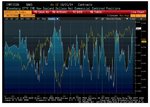Europe publishes bank health-check results - RTRS
DUBLIN, Oct 26 (Reuters) - Twenty five euro zone banks failed a landmark health check of their ability to withstand another economic crisis with a capital shortfall of 25 billion euros at the end of last year, the European Central Bank (ECB) said on Sunday.
A dozen of those banks have already addressed the gap by raising 15 billion euros over the course of this year.
Here are reactions from regulators, investors and analysts to the results.
PHOEBUS THEOLOGITES, CHIEF INVESTMENT OFFICER, STEPPENWOLF CAPITAL:
"This is the most honest assessment to-date of the dismal state of euro zone banks since the global financial crisis and, if anything, I commend the ECB for adopting such a stance."
"The ECB’s assessment should serve to sober up and alert people to the fact that nothing is fixed in the euro zone. In turn, this implies that the short-term ‘band aid’ of balance-sheet expansion by the ECB will acquire a newly-reinforced momentum on the back of the clear divergence between the euro zone and the U.S. banks."
"Now that the numbers are official, I would expect the Euro STOXX 50 Banking Index .SX7E and the Euro STOXX 50 Index .STOXX50E to open very weak for a while tomorrow, because the magnitude and percentage of failures is substantially above what some had expected."
JOE URCIUOLI, HEAD OF CREDIT RESEARCH, SPECTRUM ASSET MANAGEMENT:
"These results are not surprising. These results prove that the regulator got it right this time. We didn’t expect any big surprises – we don’t see any here. It seems to be the usual suspects that need to raise capital."
"We believe this will support market confidence. The value added here is that we think going forward, we expect the ECB as the sole regulator to test the banks using qualitative factors as well… to better give a complete picture of a bank’s risk."
"Any of those banks that have a capital shortfall with the exclusion of Lloyds… we’re not going to be invested in and we aren’t invested in. The biggest reason would be that we’re not going to take that kind of risk."
"Ireland especially is doing much better today that it was five years ago. It’s the first of the five peripheral countries that is doing better after a bailout programme, but that doesn’t mean we would invest in their banks. It’s just too soon. We have to stay with the core countries – Germany, France, the UK, the Netherlands."
"This is a step in the right direction, but this is sort of like a baby step. We need to see a couple of years of good test results for those countries and those banks before we even think about it."
"(Annual tests would) maintain credibility in the banking sector it will keep people like us more confident about the sector and more apt to invest more and more in the names we invest in and maybe different names as well."
"On the face of it I think it will be a neutral to positive event (in financial markets) but because there might be some headlines and people might get nervous if they see Italian bank headlines and Greek headlines so the market might react like it didn’t know it was coming."
"There might be some short term volatility on Monday, maybe Tuesday, but I don’t think it will be long term in nature. When you see all the sell side research that comes out today and tomorrow they are all going to point to positive results, except for the names that need to raise capital and again, those names don’t comprise the major banks."
KEVIN CORRIGAN, HEAD OF CREDIT, LOMBARD ODIER INVESTMENT MANAGERS:
“This was always a difficult exercise for investors to try and pre-judge, because the number of data points that the testers would be applying were so comprehensive that it was difficult to predict.
“It doesn’t appear to be out of line, generally, with what people were expecting, although there were more Italian banks there than we would have thought.
“Overall, I don’t think people will be swayed one way or the other, from a debt market point of view. From a bond investors’ point of view, it doesn’t look as though we’ve managed to ensnare any of the large-cap banks in this round."
“This should give investors some confidence that the landscape isn’t uninvestable, from a direct investment point of view, but just having sufficient capital isn’t going to cure the European economy of its ills. That’s what remains to be seen; to what extent this facilitates greater lending to small and medium-sized enterprises."
“From a debt market point of view, I don’t expect too much volatility tomorrow. I think there was a slight surprise that the number of Italian banks was slightly larger than maybe we might have thought."
"But there weren’t the larger cap banks that would have spooked the market."
MARIANO RAJOY, PRIME MINISTER, SPAIN:
“The Spanish financial system is great, which is vital to support the Spanish economic recovery. It’s been very difficult, and very complicated but today the European Central Bank, after studying all the banks in the euro zone, has said that the Spanish financial system is there and, for that, we can feel very proud and satisfied.”
RICHARD EDWARDS, MANAGING DIRECTOR, HED CAPITAL:
The fact that a lot of Italian banks have failed could put the Italian government bond market under renewed pressure on Monday morning."
ION-MARC VALAHU, FUND MANAGER, CLAIRINVEST:
"Overall, it’s a positive, even though most of it was leaked on Friday. This brings us closer to a banking union in the EU, as well as helping the credibility of the ECB and the banking sector. This will help EU banks raise more capital going forward. If you add to that the change in language from Merkel this weekend on the need to invest in Europe and move away from austerity, markets should at least rebound on Monday and recoup ground lost on Friday."
ANDREA LEADSOM, ECONOMIC SECRETARY TO THE UK TREASURY:
"A key part of our long term economic plan is to strengthen UK banks so that they can support the economy, help businesses, and serve customers.
"I’m pleased to see that the UK banks have passed the EBA stress tests. This shows our robust reforms to build a more resilient banking sector are working."
BANK OF SPAIN:
“This result confirms that the process of cleaning up, reforming and restructuring in the system over the last few years has produced positive results and that the Spanish lenders face the future with healthy balance sheets and an adequate solvency position.”
COLIN BRERETON, ECONOMIC CRISIS RESPONSE LEAD PARTNER, PwC:
“The Comprehensive Assessment results are in, and although this should restore some confidence and stability to the market, we are still far from a solution to the banking crisis and the challenges facing the banking sector."
"The Comprehensive Assessment was only a one-off test of solvency, not of ongoing viability. The test of long-term viability is whether banks can generate sufficient returns to cover all their costs, including capital costs."
“The point where many of Europe’s banks will be able to satisfy this long-term viability test is still a way off due to the prospect of continued weak economic conditions and low interest rates across Europe, an overhang of operating, compliance and restructuring costs, and mounting competitive threats from start-ups and non-bank challengers. The Comprehensive Assessment has bought time for some of Europe’s banks to get themselves in shape."
MAX ANDERL, HEAD OF CONCENTRATED ALPHA, UBS GLOBAL ASSET MANAGEMENT:
"There is a lot of information that needs to be looked at in detail, both in terms of the asset quality review as well as the stress test. But the first impression is that there are few surprises."
"We expected a tough and therefore more credible test. Consequently, not all of the 130 institutions were expected to do well. As expected 25 institutions failed. Indeed, the document refers to many of the ‘usual suspects’ mainly in Greece, Portugal and Italy in the quoted sector.”
ERIK NIELSEN, CHIEF ECONOMIST, UNICREDIT:
“There are way too many policy makers who think that the publication of the AQR and stress tests will itself lead to a boost in bank lending to the private sector which will somehow trigger the recovery. But that’s extremely unlikely.”
“By far the greatest share of the ‘lending problem’ is a demand problem. In the euro zone, lending to the corporate sector has always lagged GDP by 6-9 months, and I see no reason why this should be materially different this time. Thinking that lending somehow can lead GDP is an illusion, and I don’t know how that has somehow crept into the policy debate."
"Businesses need to believe in an increase in the demand for their products before asking for credits, and now that external demand growth is no longer there, this is when the euro zone needs demand stimulus. Economics 101.”




